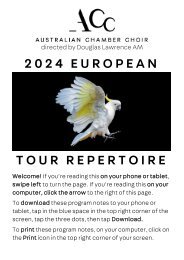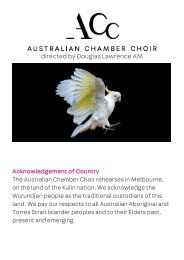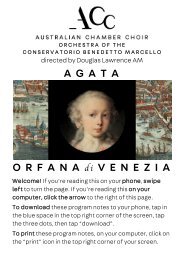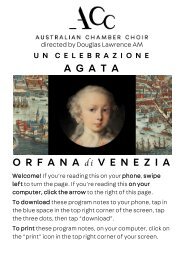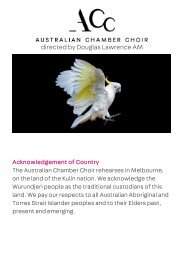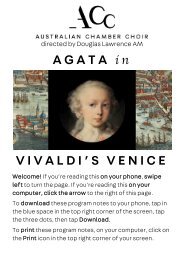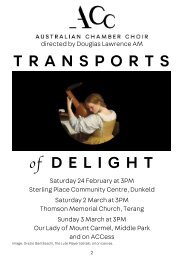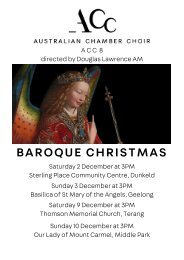Vivaldi’s Gloria, Agatha’s Cantata
Detailed program notes, with texts, translations, historical background, artists' names and illustrations.
Detailed program notes, with texts, translations, historical background, artists' names and illustrations.
Create successful ePaper yourself
Turn your PDF publications into a flip-book with our unique Google optimized e-Paper software.
directed by Douglas Lawrence AM<br />
Entrance to the Grand Canal, Venice, Giovanni (Canaletto) Canal, oil on canvas,<br />
c.1730, Museum of Fine Arts, Houston<br />
This performance is the World Premiere of Agata’s<br />
<strong>Cantata</strong>. It took place on Saturday 7 May 2022 at the<br />
Scots’ Church, Melbourne.<br />
Live performances will take place on<br />
Sunday 5 May 2024 at 3PM<br />
at the Scots’ Church Melbourne<br />
Saturday 25 May 2024 at 3PM<br />
Church of the Resurrection, Macedon<br />
Booking recommended
ot every day, nor every year nor even every decade,<br />
does an Australian program include a work<br />
performed for the first time in almost three centuries<br />
(and perhaps performed for the first time ever). Such is<br />
the case with this concert.<br />
<strong>Vivaldi’s</strong> <strong>Gloria</strong> was written in 1715 for the famous allfemale<br />
ensemble of Venice’s Ospedale della Pietà.<br />
During <strong>Vivaldi’s</strong> time teaching at this orphanage (1703-40),<br />
the Pietà developed an international reputation for its<br />
performances, presented exclusively by the young<br />
women who were educated there.<br />
In 1712, Agata (pronounced like Agatha), a baby born<br />
without fingers on her left hand, was passed through the<br />
small revolving door (called a scafetta) in the<br />
orphanage’s exterior wall. Later, she became a star<br />
student, performing as a soprano soloist and composing<br />
cantatas. Her compositions have remained hidden until<br />
today as fragments in a Venetian library.<br />
You are one of the first people to hear Agata’s <strong>Cantata</strong><br />
outside the walls of the Venice orphanage where it was<br />
written, three hundred years ago.<br />
The works on today’s program all come from a time when<br />
there was more stillness in people’s lives – three works<br />
written during the 18 th century and one work, Christine<br />
McCombe’s Power in stillness, written recently, as<br />
Melbourne endured the world’s longest lockdown.<br />
2
PROGRAM<br />
FRANCESCO DURANTE (1684–1755)<br />
Magnificat (formerly attributed to Giovanni B Pergolesi)<br />
CHRISTINE MCCOMBE (born 1967)<br />
Power in stillness<br />
AGATA DELLA PIETÀ (1712–69)<br />
Ecce nunc (Psalm 134, Latin Vulgate 133)<br />
ANTONIO VIVALDI (1678–1741)<br />
<strong>Gloria</strong> RV 589<br />
PROGRAM NOTES<br />
MAGNIFICAT in Bb – Francesco Durante<br />
Born in Frattamaggiore, Italy, 31 March 1684; died in<br />
Naples, 30 September 1755<br />
This work’s origins formed a long-standing puzzle.<br />
Starting from 1910, it was widely assumed that the<br />
Magnificat had been written by a much better-known<br />
and shorter-lived composer from the next generation:<br />
Giovanni Battista Pergolesi, who had been one of<br />
Durante’s numerous pupils in Naples. On stylistic<br />
grounds, the Pergolesi attribution made sense; the<br />
3
DURANTE<br />
Browse the ACC’s 2024 Concerts<br />
music’s buoyant, predominantly diatonic character<br />
seemed closer to Pergolesi’s habitual idiom than it did to<br />
the complex, rarefied, and highly chromatic manner that<br />
Durante often cultivated. Later, though, the discovery of<br />
a manuscript of the Magnificat in Durante’s handwriting<br />
(and, crucially, also containing Durante’s signature as<br />
evidence of authorship), pointed to the older man’s<br />
ultimate responsibility for the piece.<br />
Portrait of Francesco Durante, Anonymous 18 th century painting, Bologna, Civico<br />
Museo Bibliografico Musicale<br />
4
DURANTE<br />
Browse the ACC’s 2024 Concerts<br />
At the beginning, the main theme – as the music’s original<br />
audiences would have realised – constitutes a longdrawn-out<br />
plainchant melody traditionally associated<br />
with the Magnificat’s opening words. Few moments in<br />
the entire choral literature can surpass, for sheer<br />
excitement, the return of this theme at the words ‘Sicut<br />
erat in principio’, elaborated this time, but accompanied<br />
by similar chugging Vivaldian string motifs.<br />
Chorus<br />
Magnificat anima mea<br />
Dominum,<br />
Et exsultavit spiritus meus in<br />
Deo salutari meo.<br />
Quia respexit<br />
humilitatem ancillae suae;<br />
ecce enim ex hoc beatam<br />
me dicent omnes<br />
generationes.<br />
Quia fecit mihi magna qui<br />
potens est, et sanctum<br />
nomen eius.<br />
Soprano, Alto solos<br />
Et misericordia<br />
a progenie in progenies<br />
timentibus eum.<br />
Fecit potentiam in bracchio<br />
suo;<br />
My soul doth magnify the<br />
Lord,<br />
And my spirit hath rejoiced<br />
in God my Saviour.<br />
For He hath regarded the<br />
lowliness of His handmaid;<br />
for behold, from<br />
henceforth all generations<br />
shall call me blessed.<br />
For He that is mighty hath<br />
done great things for me,<br />
and holy is His name.<br />
And His mercy is on them<br />
that fear Him<br />
throughout all generations.<br />
He hath shown strength<br />
with His arm; He hath<br />
5
DURANTE<br />
dispersit superbos mente<br />
cordis sui.<br />
Browse the ACC’s 2024 Concerts<br />
scattered the proud in the<br />
imagination of their hearts.<br />
Chorus<br />
Deposuit<br />
potentes de sede<br />
Et exaltavit<br />
humiles.<br />
Esurientes implevit<br />
bonis et<br />
divites dimisit<br />
inanes.<br />
Tenor and Bass Duet<br />
Suscepit Israel puerum<br />
suum, recordatus<br />
misericordiae suae,<br />
Chorus<br />
Sicut locutus est ad patres<br />
nostros, Abraham et semini<br />
eius in saecula.<br />
<strong>Gloria</strong> Patri,<br />
et Filio,<br />
et Spiritui Sancto:<br />
Chorus<br />
Sicut erat in principio,<br />
et nunc et semper,et in<br />
saecula saeculorum. Amen.<br />
6<br />
He hath put down the<br />
mighty from their seat,<br />
and hath exalted<br />
the humble and meek.<br />
He hath filled the hungry<br />
with good things and the<br />
rich He hath sent empty<br />
away.<br />
Remembering His mercy,<br />
He hath holpen His servant<br />
Israel:<br />
As He promised to our<br />
forefathers, Abraham and<br />
his seed forever.<br />
Glory be to the Father,<br />
and to the Son,<br />
and to the Holy Ghost:<br />
as it was in the beginning,<br />
is now and ever shall be,<br />
world without end. Amen
TWO WORLD PREMIERES<br />
Browse the ACC’s 2024 Concerts<br />
POWER IN STILLNESS – Christine McCombe<br />
Born in Rosebud, Victoria, 3 April 1967<br />
Christine McCombe studied at the University of<br />
Melbourne, during which time she sang in the Choir of<br />
Ormond College under the direction of Douglas<br />
Lawrence. After studies with James McMillan at the<br />
Royal Scotish Academy of Music and Drama she went on<br />
to complete a PhD in composition at the University of<br />
Edinburgh. Composition prizes and awards include the<br />
Dorian Le Galienne Composition Award, the Lyrebird<br />
Music Society Composition Prize, a Keith and Elisabeth<br />
Murdoch Fellowship, a Centre Acanthes (France) Bursary,<br />
a Bundanoon Artists Trust Residency and most recently,<br />
the 2018 Pythia Prize. Her compositions have been<br />
performed by the BBC Scottish Symphony Orchestra,<br />
Vienna Piano Trio, Topology Ensemble, Australia<br />
Ensemble and the Australian Chamber Choir to name a<br />
few. Recent performances of her works have taken place<br />
in the Resonant Bodies Festival (New York), the National<br />
Gallery of Victoria and the Melbourne Recital Centre. A<br />
CD of her chamber music, entitled Three kinds of silence<br />
was released on the Tall Poppies label in 2018.<br />
Power in Stillness was commissioned by the ACC in 2020<br />
with support from Modest Expectations. The work was to<br />
be performed by the ACC as part of their 2021 European<br />
tour, which was cancelled due to COVID restrictions.<br />
7
MCCOMBE<br />
Browse the ACC’s 2024 Concerts<br />
Christine explains the origins of her new work (for which,<br />
in August 2020, she wrote the text) as follows:<br />
I composed Power in Stillness during the<br />
COVID lockdowns of 2020 and 2021, while<br />
navigating the reality of having two<br />
teenagers at home attempting school and<br />
a husband in the next room attempting to<br />
teach high school English remotely. I<br />
remember feeling that time itself had<br />
taken on a strange quality. There were<br />
long pauses, a lot of waiting, a lot of time<br />
to sit and think and just be. As a family we<br />
spent a lot of time together in the same<br />
place, and daily ‘mental health walks’<br />
became a necessity. We live near a hidden<br />
gem of a creek – Edgars Creek – that<br />
snakes quietly through some of<br />
Melbourne’s northern suburbs, the land of<br />
the Wurundjeri / Woi Wurrung people.<br />
Many of my walks would be along this<br />
creek, through the quiet groves of<br />
eucalypts, past rocky escarpments,<br />
listening to the quiet, the waters gently<br />
passing over mossy rocks, the native birds,<br />
particularly the kookaburras. It was time to<br />
breathe, to listen, to feel the ground under<br />
my feet, to spend time with trees and the<br />
feeling of slowness they evoke, the sense<br />
8
MCCOMBE<br />
Browse the ACC’s 2024 Concerts<br />
of connection to the land and the land’s<br />
history reaching back before European<br />
voices were heard here. I loved these<br />
walks: the connection with stillness and<br />
the land, listening with my whole body.<br />
The concept of listening to the land, ‘Deep<br />
Listening’, is as old as the land itself. It<br />
reminds me of the immense wisdom and<br />
knowledge of First Nations peoples, it<br />
reminds me to be humble and grateful. In<br />
composing Power in Stillness, I sought to<br />
evoke these qualities of stillness, of<br />
listening to the ‘spaces between’, and<br />
also reflect on the concepts of isolation<br />
and connectedness that the various<br />
lockdowns seemed to bring into focus.<br />
There is a power<br />
In stillness<br />
In silence<br />
In waiting<br />
Looking up to the sky<br />
Feeling the earth below<br />
Standing in awe<br />
And silence<br />
Listening<br />
9
MCCOMBE<br />
Browse the ACC’s 2024 Concerts<br />
There is a power<br />
In stillness<br />
In silence<br />
In waiting<br />
Listening<br />
To the spaces between trees<br />
As we stand<br />
And breathe<br />
Finding the quiet within<br />
There is a power<br />
In stillness<br />
In silence<br />
In waiting<br />
Remembering<br />
That we can stand alone<br />
And still be connected<br />
Like the quiet language of trees<br />
Beneath the surface<br />
Their roots entwined<br />
Reaching out and holding strong<br />
There is a power<br />
In stillness<br />
In silence<br />
In waiting<br />
10
Browse the ACC’s 2024 Concerts<br />
ECCE NUNC – Agata della Pietà<br />
Born probably in Venice, 24 March 1712; died in Venice, 17<br />
October 1769<br />
Not every day, nor every year nor even every decade,<br />
does an Australian program include a work performed for<br />
the first time in almost three centuries (and perhaps<br />
performed for the first time ever). But such is the case<br />
with this concert. Elizabeth Anderson explains the feats<br />
of musicological sleuthing that enabled her to revive the<br />
six-movement Ecce Nunc, which incorporates words<br />
taken from Psalm 134 (Psalm 133 in the Latin Vulgate<br />
translation):<br />
I’ve always been fascinated by the idea<br />
that orphans in eighteenth-century Venice<br />
were given an excellent education in<br />
music. Evidently it was only selected<br />
female orphans who had this privilege, as<br />
it was considered more useful to teach<br />
male orphans a trade. When still at high<br />
school, I read about Vivaldi teaching at the<br />
Ospedale della Pietà. Since then I’ve<br />
pondered the idea that there might be<br />
compositions by unknown female<br />
composers to be rediscovered.<br />
When we decided on a performance of<br />
the Vivaldi <strong>Gloria</strong> for our 2022 program, my<br />
curiosity was reignited. Browsing Google<br />
11
AGATA<br />
Browse the ACC’s 2024 Concerts<br />
to see what might be unearthed, I entered<br />
an Italian-language search, as I’ve found<br />
that Google doesn’t search very<br />
effectively across languages. A cluster of<br />
Italian articles about music education in<br />
Venetian orphanages confirmed that I was<br />
on track to find at least some fragments of<br />
compositions by female orphan<br />
composers.<br />
My search narrowed to a Venetian library,<br />
which I contacted by email. One particular<br />
librarian was more than happy to help and<br />
after a further exchange of emails,<br />
furnished me with copies of an<br />
incomplete set of manuscript parts for<br />
Ecce Nunc, by Agata della Pietà. You can<br />
imagine my excitement when, the day<br />
after requesting the manuscripts, the set<br />
12
AGATA<br />
Browse the ACC’s 2024 Concerts<br />
of yellowed images arrived in my inbox. All<br />
the surviving manuscript parts were put at<br />
my disposal: I had a complete first violin<br />
part and a complete cello part. Choir parts<br />
for alto and bass gave only three of the six<br />
movements, with the remaining three<br />
movements marked tacet. Those three<br />
movements in which the choral singers<br />
were silent must be vocal solos, which<br />
would need to be reconstructed. The<br />
handwriting was very clear, but there were<br />
crossings-out and, at first glance, the<br />
parts for each movement seemed to have<br />
different numbers of bars.<br />
I decided to key in the available material<br />
for the opening movement for choir and<br />
orchestra to create a skeletal full score,<br />
from which we could assess the<br />
composition and calculate how much<br />
work would be involved in a possible<br />
reconstruction. After an hour’s work, it<br />
was clear that we were dealing with an<br />
exciting piece of choral and orchestral<br />
writing similar in style to the Vivaldi <strong>Gloria</strong>.<br />
At this point, Douglas Lawrence and I knew<br />
that we had struck gold!<br />
I’m grateful to our son, Jacob Lawrence,<br />
13
AGATA<br />
Browse the ACC’s 2024 Concerts<br />
(who recently completed a Masters<br />
degree specialising in Baroque repertoire<br />
at the Schola Cantorum Basiliensis) for his<br />
assistance in reviewing my drafts.<br />
Page one of the first violin part of Agatha della Pietà’s<br />
<strong>Cantata</strong>, Ecce Nunc<br />
The composer, whose surname is unknown – the records<br />
identify her purely as ‘Agata’ –had been born without the<br />
four fingers of her left hand. She arrived at the Pietà<br />
shortly after her birth in 1712, most likely given up by her<br />
parents because of her apparent disability. Agata soon<br />
shone as a star student. Two local musicians, Andrea<br />
Bernasconi and Giovanni Porta, left manuscripts of<br />
cantatas that specifically identify Agata as a soprano<br />
soloist.<br />
Agata never married and continued to live at the Pietà,<br />
14
AGATA<br />
Browse the ACC’s 2024 Concerts<br />
employed first as a teacher of singing and later also as<br />
the institution’s administrator. She is mentioned in a<br />
poem, of unknown authorship, which describes the<br />
Pietà’s musical life. It is a privilege to ensure that Agata,<br />
after 280 years of silence, can have her creativity<br />
appreciated by a wider audience.<br />
Soprano solo, Chorus<br />
Ecce nunc benedicite<br />
Dominum,<br />
Soprano solo<br />
omnes servi Domini:<br />
Qui statis in domo<br />
Domini, in atriis<br />
domus Dei nostri.<br />
Alto solo<br />
In noctibus extollite<br />
manus<br />
vestras in sancta,<br />
et benedicite Dominum.<br />
Chorus<br />
Benedicat te Dominus ex<br />
Sion, qui fecit caelum et<br />
terram.<br />
Soprano Duet<br />
<strong>Gloria</strong> Patri,<br />
Now bless our Lord:<br />
all ye servants of our Lord;<br />
Who stand in the house of<br />
our Lord, in the courts of<br />
the house of our God.<br />
In the nights lift up your<br />
hands<br />
in the holy places,<br />
and bless ye our Lord.<br />
Our Lord out of Sion bless<br />
Thee, who made heaven<br />
and earth.<br />
Glory be to the Father,<br />
15
AGATA<br />
et Filio,<br />
et Spiritui Sancto:<br />
Browse the ACC’s 2024 Concerts<br />
and to the Son,<br />
and to the Holy Ghost:<br />
Soprano solo, chorus<br />
Sicut erat in principio,<br />
et nunc et semper,et in<br />
saecula saeculorum.<br />
as it was in the beginning,<br />
is now and ever shall be,<br />
world without end.<br />
Agata’s First Commercial Recording<br />
The new CD, Keys to Heaven,<br />
includes Agata’s <strong>Cantata</strong>,<br />
Palestrina’s Tu es Petrus and Missa<br />
Aeterna Christi Munera, as well as<br />
Allegri’s Miserere and Christus<br />
resurgens.<br />
Click/tap here to BROWSE CDs<br />
Book now for a live performance<br />
AGATA IN VIVALDI’S VENICE<br />
Sunday 5 May at 3PM<br />
The Scots’ Church, Melbourne<br />
Saturday 25 May at 3PM<br />
Church of the Resurrection,<br />
Macedon<br />
MORE/BOOK NOW<br />
16
Travel with the ACC to Europe<br />
The ACC sings at St Marks Venice<br />
and performs Agata’s <strong>Cantata</strong> in<br />
the Venetian baroque splendour<br />
of Palazzo Pisani. One place<br />
remains to join the ACC on tour for<br />
16 days (Bruges to Venice): 6<br />
concerts, 3 programs, meals, postconcert<br />
celebrations.<br />
LEARN MORE ABOUT THE 2024 TOUR<br />
Thank you to our donors!<br />
We are immensely grateful to the ACC’s donors (listed on<br />
pages 25 to 27) for the important<br />
part that they continue to play in<br />
the payment of our singers, and<br />
the success story that is the<br />
Australian Chamber Choir. We<br />
provide a rigorous training ground<br />
for young professional singers.<br />
With this training, singers like<br />
Amelia Jones (pictured above with Kieran Macfarlane),<br />
Erika Tandiono and Jacob Lawrence can pursue careers<br />
singing with UK and European ensembles. We would love<br />
to welcome you into our lively group of supporters, the<br />
lifeblood of the ACC. Donations to the ACC are tax<br />
deductible.<br />
DONATE<br />
17
GLORIA Antonio Vivaldi<br />
Born in Venice, 4 March 1678; died in Vienna, 28 July 1741<br />
Considering that the Vivaldi <strong>Gloria</strong> (number 589 in the<br />
catalogue released during the 1970s by Danish scholar<br />
Peter Ryom) ranks second only to The Four Seasons as<br />
the composer’s greatest popular hit of modern times, it<br />
remains odd how little we know about its origins. We<br />
cannot say with any confidence when he penned it. The<br />
year 1715 has been suggested, but a mere suggestion it<br />
remains. Few realise that Vivaldi set the same text twice<br />
more, though only one of these alternative settings<br />
survives, the other being – perhaps irretrievably – lost.<br />
The alternative setting, now identified as RV588, is in the<br />
same key (D major) as its far better-known companion,<br />
inspiring the hypothesis that it served as a first draft, and<br />
that Vivaldi later gave it a comprehensive overhaul.<br />
If this hypothesis is true, it demonstrates unusual<br />
behaviour on the composer’s part. On the whole, Vivaldi<br />
lacked the enthusiasm for creative recycling which both<br />
Bach and Handel many times showed. (So much for the<br />
ignorant and facetious jibe, often attributed to<br />
Stravinsky, about Vivaldi ‘writing the same concerto five<br />
hundred times.’)<br />
Far from hypothetical, indeed remarked on almost to the<br />
point of notoriety in the last eighty years’ scholarly<br />
literature, is <strong>Vivaldi’s</strong> dependence for part of RV589 (and,<br />
for that matter, RV588) upon the output of an otherwise<br />
18
VIVALDI<br />
Browse the ACC’s 2024 Concerts<br />
totally obscure fellow Italian: Giovanni Maria Ruggieri,<br />
thought to have been born around 1665 and to have died<br />
around 1724. The grand finale to RV589, ‘Cum sancto<br />
spiritu,’ is closely based upon a Ruggieri fugue.<br />
Before we condemn Vivaldi outright for such plagiarism,<br />
three extenuating circumstances warrant emphasis. First,<br />
the drastic pressures of time under which Vivaldi always<br />
operated: rather than writing for a posterity which might<br />
or might not condescend to applaud him decades after<br />
he died, he needed to have his compositions ready for<br />
audiences (in this case for audiences at Venice’s Pietà),<br />
and paid for by accounts departments within weeks or<br />
sometimes days. Second, during the early eighteenth<br />
century – as British critic William G. McNaught wrote in<br />
1935 – ‘copyright was then but half established, either in<br />
morals or at law.’ Third, the expectation prevailed among<br />
<strong>Vivaldi’s</strong> contemporaries that a composer who borrowed<br />
music had to pay it back with abundant interest,<br />
improving on the borrowed item rather than lazily<br />
reproducing it note-for-note. This Vivaldi certainly did,<br />
because his ‘Cum sancto spiritu’ contains passages<br />
nowhere hinted at in the Ruggieri original. Handel<br />
exhibited similar enterprise in his own borrowings from<br />
other composers’ scores; as Handel’s admirer William<br />
Boyce observed, ‘He takes Pebbles and turns them into<br />
Diamonds.’<br />
It should never be forgotten that Vivaldi thought of<br />
himself – as did his contemporaries – as chiefly an<br />
19
VIVALDI<br />
Browse the ACC’s 2024 Concerts<br />
operatic composer. However seldom his forty-odd<br />
operas are heard now, during his lifetime they carried his<br />
fame outside the Italian peninsula, in a way that The Four<br />
Seasons never then managed. The twelve movements of<br />
the <strong>Gloria</strong> suggest the opera house. The boisterous,<br />
fanfare-laden opening (which returns near the end); the<br />
vivacity of the vocal duetting in Laudamus te; the<br />
atmosphere of Yuletide pastoral calm throughout<br />
Domine Deus, Rex coelestis, with its haunting oboe solo<br />
(taken in some performances by a violin); the unusually<br />
chromatic choral harmonies in Qui tollis; all these, and<br />
many other sections, reveal that Vivaldi saw no need to<br />
purge secular elements from his writing of sacred music.<br />
Nor would his original listeners have desired such<br />
purgation: much of this music owed its very existence to<br />
the fact that Venice’s theatres had closed for Lent,<br />
rather than to any more unctuously spiritual pretext.<br />
Almost the sole concessions to ecclesiastical<br />
requirements at the Pietà were the metal grilles behind<br />
which the female performers were partly concealed<br />
while they played and sang. Jean-Jacques Rousseau<br />
found the Pietà to be ‘always full of music lovers …’ He<br />
complained that what grieved him were ‘those accursed<br />
grilles, which allowed only notes to go through and<br />
concealed the angels of loveliness of whom they were<br />
worthy.’ Better luck befell visiting French politician<br />
Charles de Brosses, who reported of the ladies: ‘I vow to<br />
you that there is nothing so diverting as the sight of a<br />
20
VIVALDI<br />
Browse the ACC’s 2024 Concerts<br />
young and pretty nun, in a white habit, with a bunch of<br />
pomegranate blossoms over her ear, conducting the<br />
orchestra and beating time with all the grace and<br />
precision imaginable.’<br />
Did either tourist hear the <strong>Gloria</strong>? While it would be<br />
pleasant to think so, documentary proof has not been<br />
found. Though the sheer neatness of its manuscript<br />
implies that Vivaldi could well have taken special trouble<br />
over the piece, such neatness failed to prevent its<br />
neglect for almost two centuries after <strong>Vivaldi’s</strong> death in<br />
1741: a neglect in which almost all his music shared (the<br />
main exceptions being those concertos known through<br />
Bach’s arrangements). Only in 1939, when the composer<br />
Alfredo Casella – aided by, among others, the Vivaldiloving<br />
poet Ezra Pound – organised a week-long festival<br />
in Siena to pay the composer homage, did the <strong>Gloria</strong><br />
come afresh to public notice. Since then, it has been<br />
accorded over a hundred recordings (the first of those<br />
appears to be one from 1954, involving a Paris<br />
Conservatoire ensemble under the little-known<br />
conductor André Jouve). In 2022 it has yet to wear out its<br />
welcome with the general public.<br />
Chorus<br />
<strong>Gloria</strong> in excelsis Deo,<br />
Chorus<br />
Et in terra pax hominibus<br />
bonae voluntatis.<br />
Glory to God in the<br />
highest,<br />
And on earth peace to<br />
people of good will.<br />
21
VIVALDI<br />
Soprano Duet<br />
Laudamus te, benedicimus<br />
te, adoramus te,<br />
glorificamus te.<br />
Chorus<br />
Gratias agimus tibi<br />
Chorus<br />
propter magnam gloriam<br />
tuam.<br />
Soprano solo<br />
Domine Deus,<br />
Rex coelestis,<br />
Deus Pater omnipotens.<br />
Chorus<br />
Domine Fili unigenite<br />
Jesu Christe,<br />
Browse the ACC’s 2024 Concerts<br />
We praise You, we bless<br />
You, we adore You,<br />
we glorify You.<br />
We give You thanks<br />
for the great glory that is<br />
yours<br />
Lord God,<br />
heavenly King,<br />
O God Almighty Father.<br />
Lord Only Begotten Son,<br />
Jesus Christ,<br />
Alto solo and Chorus<br />
Domine Deus, Agnus Dei,<br />
Filius Patris. Qui tollis<br />
peccata mundi,<br />
miserere nobis.<br />
Chorus<br />
Qui tollis peccata<br />
mundi, suscipe<br />
deprecationem nostram.<br />
22<br />
Lord God, Lamb of God,<br />
Son of the Father. You<br />
take away the sins of the<br />
world, have mercy on us.<br />
You take away the sins of<br />
the world, receive<br />
our prayer.
VIVALDI<br />
Browse the ACC’s 2024 Concerts<br />
Alto solo<br />
Qui sedes ad dexteram<br />
patris,<br />
miserere nobis.<br />
Chorus<br />
Quoniam tu solus sanctus,<br />
tu solus Dominus,<br />
tu solus altissimus<br />
Jesu Christe.<br />
Chorus<br />
Cum Sancto Spiritu<br />
in gloria Dei<br />
Patris, Amen<br />
You are seated at the right<br />
hand of the Father,<br />
have mercy on us.<br />
For You alone are the Holy<br />
One, You alone are the<br />
Lord, You alone are the<br />
Most High, Jesus Christ.<br />
With the Holy Spirit,<br />
in the glory of God the<br />
Father. Amen.<br />
Program notes © Robert James Stove, 2014,2022;<br />
© Christine McCombe 2020, 2022;<br />
© Elizabeth Anderson 2022<br />
23
ACC performers * denotes soloists<br />
Soprano<br />
Sarah Amos<br />
Alex Hedt<br />
Amelia Jones*<br />
Kristina Lang*<br />
Elizabeth Lieschke<br />
Katherine Lieschke<br />
Alto<br />
Elizabeth Anderson*<br />
Melissa Lee<br />
Isobel Todd<br />
Jennifer Wilson-Richter<br />
Violin I<br />
Jennifer Kirsner<br />
Viola<br />
David Hanner<br />
Double Bass<br />
Bill Cawte<br />
Organ<br />
Rhys Boak<br />
Tenor<br />
Matthew Bennett*<br />
Samuel Rowe<br />
Tanum Ship<br />
Leighton Triplow<br />
Bass<br />
Thomas Drent*<br />
Kieran Macfarlane<br />
Alex Owens<br />
Lucas Wilson-Richter<br />
Violin II<br />
Arun Patterson<br />
Violoncello<br />
Edwina Cordingley<br />
Trumpet<br />
Joel Brennan<br />
This performance takes place thanks to the generous<br />
support of the Robert Salzer Foundationan, the<br />
Bendigo Bank, and an anonymous donor, in memory<br />
of Ara Vartoukian
SUPPORTERS<br />
We would like to thank all our donors, including those who wish to remain anonymous.<br />
BEQUESTS<br />
Rosemary Gleeson<br />
Margaret Lawrence<br />
Lorraine Meldrum<br />
MAJOR DONORS<br />
Dr Merrilyn Murnane AM<br />
and the late<br />
Rev Max Griffiths MBE<br />
Dr Jan Schapper and<br />
Dr Mark Schapper<br />
DONORS<br />
$20,000+<br />
Robin Batterham<br />
The late Bob Henderson<br />
Alana Mitchell<br />
$10,000+<br />
Pat and Derek Duke<br />
Michael Elligate<br />
The late Thorry Gunnersen<br />
Peter Kingsbury<br />
Caroline Lawrence<br />
$5,000+<br />
Iris Anderson and the late<br />
Warren Anderson<br />
James and Barbara Barber<br />
Sally Brown<br />
Jason Catlett<br />
Robert Dempster and<br />
Robin Bell<br />
Mary-Jane Gething<br />
John Griffiths and<br />
Berni Moreno<br />
Stuart and Sue Hamilton<br />
Arwen Hur<br />
The late Hector Maclean<br />
Ian Phillips<br />
Alma Ryrie-Jones<br />
Cathy Scott<br />
Harry Williams<br />
$3,000+<br />
John and Fiona Blanch<br />
Hellen Fersch<br />
Bruce Fethers and<br />
Jennifer Smith<br />
Barry and Nola Firth<br />
Richrd Hoy<br />
Cheryl and John Iser<br />
Barbara Kristof<br />
Dorothy Low<br />
Sarah and Peter Martin<br />
Philippa Miller and<br />
the late Alf Miller<br />
Anna Price<br />
Geoff and Angela Scollary<br />
$1,000+<br />
Rae Anstee<br />
Mary and John Barlow<br />
Elizabeth Burns<br />
Margaret Callinan<br />
Margaret Flood<br />
Dianne Gome<br />
Heather and Ian Gunn<br />
Alan Gunther<br />
Bernice Hand<br />
Ferdi Hillen<br />
Anthea Hyslop<br />
Jerry Koliha and<br />
Marlene Krelle<br />
George and Anne<br />
Littlewood<br />
Helen Lyth<br />
Mary McGivern-Shaw<br />
The late Rowan McIndoe<br />
Kate Michael and the late<br />
Barry Michael<br />
Leonie Millard and<br />
Matthew Pryor<br />
25<br />
The late Elisabeth<br />
Murdoch<br />
Maria and Allan Myers<br />
James and June Nagorcka<br />
Ross Nankivell<br />
Susan and Richard Nelson<br />
Henk Nieuwenhuizen<br />
Paul and Sue Nisselle<br />
Ron Ogden<br />
Joan Roberts<br />
Clare and Tom Scott<br />
Stephen Shanasy<br />
David and Lorelle Skewes<br />
Sandra Speirs<br />
Nicole Spicer<br />
Eve Steel<br />
Brian Swinn<br />
Pauline Tointon<br />
Frank West<br />
Pamela Wilson<br />
Glen Witham<br />
Robert and Helen Wright<br />
$200+<br />
Corry and Keith Adams<br />
Rita Bagossy<br />
Jennifer Bellsham-Revell<br />
Jane Bland<br />
Barbara Braistead<br />
Margaret Breidahl<br />
Nicholas and Debbie Carr<br />
Joy Carver<br />
Kenneth Cahill<br />
Catherine Clancy<br />
June Cohen<br />
Greg Coldicutt<br />
Tony and Madge Correll<br />
Michael Dolan<br />
John Eager<br />
Michael Edgeloe
$200+ (continued)<br />
John Edmonds<br />
Tom and Kate Eggers<br />
John and Margaret Emery<br />
Rosemary Fethers<br />
Anne Gilby<br />
Craig Gliddon<br />
Lois Goodin<br />
Stephen Gray<br />
Clare Green<br />
Robert and Susan Gribben<br />
Carol Harper<br />
Christine Haslam<br />
Tom Healey and<br />
Helen Seymour<br />
Litha Heshusius<br />
Geoffrey Hogbin<br />
Geoff Hone<br />
Doug Hooley<br />
Lyn Howden and<br />
David Beauchamp<br />
Annemarie Hunt<br />
Barry Jones and<br />
Rachel Fagetter<br />
Huw Jones<br />
Helen Jordan<br />
Deborah Kayser and<br />
Nic Tsavios<br />
Louise Kornman<br />
Alan and Beverley Larwill<br />
Graham and Marian<br />
Lieschke<br />
Pamela Lloyd<br />
Dawn and Peter Lord<br />
The late Heather Low<br />
Cathy Lowy<br />
Sue Lyons<br />
Bradley Maclarn<br />
Fiona McCook<br />
Mark McDonald<br />
Lyn McKenzie<br />
Hilary McPhee<br />
Penelope Maddick<br />
Chris Maxwell<br />
Sue Millar and Arie Baelde<br />
Mary Muirhead and Tom<br />
Gleisner<br />
Rod Mummery<br />
Joy Murray<br />
Sheila Nash<br />
Christine Newman<br />
Magaret Newman<br />
Stephen Newton<br />
The late Julianna O’Bryan<br />
Ross Philpott<br />
Yoko Pinkerton<br />
Nancy Price<br />
Di and Ian Renard<br />
Dianne and Gary Richter<br />
Angela and Paul Riggs<br />
Annette and David<br />
Robinson<br />
Noeline Sandblom<br />
Muharrem Sari<br />
Lindsay Smyth<br />
Lenore Stephens<br />
Eric Stokes<br />
Rob Stove<br />
Rosalie Strother<br />
Marion Taubman and<br />
Harvey Jacka<br />
Ross Telfer<br />
Roger Thompson<br />
Andrew Turner<br />
Dennis Ward<br />
Mel Waters<br />
Christopher and Roslyn<br />
White<br />
Charles and Carolyn<br />
Williams<br />
D’Arcy Wood<br />
Margot Woods<br />
Wallace Young<br />
The late Jennifer Young<br />
Margaret and Paul Zammit<br />
$100+<br />
Meghan Anders<br />
Judith Antcliff<br />
Christine Ashley<br />
Vicki and Peter Balabanski<br />
Malcolm Baxter<br />
Helen and Brian Bayston<br />
Helen Begley<br />
Elizabeth Bennetto<br />
David Bond<br />
Patricia Brincat<br />
Mark Brolly<br />
Bill Burdett<br />
Jennifer Butler<br />
26<br />
Joelle Champert<br />
Brian and Lucy Chapman<br />
Ciane Clark<br />
Lois Cooke<br />
Judith Couch<br />
John De Luca<br />
Christian Doerig<br />
Mary Duckworth<br />
Rod Edwards<br />
Christine Forster<br />
Catherine Francis and Alan<br />
Todd<br />
Roger and Gillian Gamble<br />
Marina Garlick<br />
Claire and Sam Gatto<br />
Sylvia Geddes<br />
Marged Goode<br />
Fiona Graham<br />
Susan Grant<br />
Mrs JT Hadges<br />
Jeff Haines<br />
Jennifer Hardy<br />
Lorna Henry<br />
Jane Hockin<br />
Miranda Hoffman<br />
Margaret Irving<br />
Rhonda Irving<br />
Priscilla Jamieson<br />
Christopher Jessup<br />
Malcolm Johns<br />
Barbara Johnson<br />
David Jones and Anne<br />
McKinley<br />
Garry Joslin<br />
Marie Joyce<br />
Vicky Karitinos<br />
Max and Marie Kau<br />
Murray Kellam<br />
Barry and Judith Kilmartin<br />
Trevor Kingsbury<br />
Hans Kuhn<br />
Elizabeth Lewis<br />
Noeline and Ken Linard<br />
Clare Lincoln<br />
Bruce Livett<br />
John Lorkin<br />
Anne Makepeace<br />
Ethne Marshall<br />
Campbell and Noreen<br />
McAdam
Clare McArdle<br />
Noel and Donna McIntosh<br />
Lyn McKenzie<br />
David Jones and Anne<br />
McKinley<br />
Ann McNair<br />
Diana Melleuish<br />
Paul Michele<br />
Niq Morcos and<br />
Morgaine Williams<br />
Rosemary & Bruce Morey<br />
Ailsa and Bob Morgan<br />
Evelyn Mortimer<br />
Christine Newman<br />
Mark and Margaret Norton<br />
Betty and Peter O'Brien<br />
Cynthia O'Keefe<br />
Margaret Pagone<br />
Murray Paterson<br />
Michele Paul<br />
Marg Pearson<br />
Bill and Jenny Rap<br />
Michele Reid<br />
Rosalie Richards<br />
Dianne Richter<br />
John and Carol Ride<br />
John and Naomi Rivers<br />
John and Cynthia Rowe<br />
Jaga Szczepanik<br />
Hans Schroeder<br />
Terry Sheahan<br />
Lynne Star<br />
Geoffrey Steventon<br />
Robin Stretch<br />
Rosalie Strother<br />
Margaret Swann<br />
Nicholas Thomas<br />
Simon and Lynne Thornton<br />
Karin Tiedemann<br />
Ian Traill-Sutherland<br />
Myrna Trute<br />
Annie Turner<br />
David Tuke<br />
Mark Tweg<br />
Christine and David Volk<br />
Doug and Rosalie Walter<br />
Richard Wardman<br />
Patricia Wilkinson<br />
Marian Worcester<br />
Wendy Wright<br />
Jennifer York<br />
Peter Zegenhagen<br />
Other Donors<br />
22/4/2021 to 5/4/2022<br />
Seaforth Anderson<br />
Sharyn Anderson<br />
Jennifer Barke<br />
Susan Bray<br />
Alastair Campbell<br />
Nicholas Capes<br />
Stephen Carey<br />
Marg Carroll<br />
Esteban Chemke<br />
Avrille Ciccone<br />
Lou Citroen<br />
Gary Clark<br />
Susan Clarke<br />
Tom Clarke<br />
Madi Claus<br />
Judith Constable<br />
Richard Davey<br />
Sue Dunn<br />
Colin Fiford<br />
Steve Filletti<br />
Peter Flinn<br />
Patricia Foley<br />
Elizabeth Gateley<br />
Colin Giles<br />
Marita Gill<br />
Jacob Gillies<br />
Joel and Amanda Gladman<br />
Angie Gleeson<br />
Margaret Glide<br />
Lyn Godwin<br />
Marged Goode<br />
Wendy Gregory<br />
Jan and John Reynolds<br />
William Haebich<br />
Barbra and John Hamilton<br />
Robert Hannah<br />
Michael Hannan<br />
Kiim Harley<br />
Richard Hogan<br />
Jenny Holmes<br />
Margaret Hughes<br />
Carole Hynes<br />
Dmitri Iakouba<br />
Alan Isaacs<br />
Gen Johnson<br />
Ronald Jones<br />
Pamela Jordan<br />
27<br />
Felicity Lain<br />
Peter Le Breton<br />
Janet Limb<br />
clare Lincoln<br />
Freida Livingstone<br />
Trish McDonald<br />
Belinda Mackie<br />
John Margetts<br />
Keith Mason<br />
Vaughan McGillivery<br />
Ann McKenzie<br />
Rick McLean<br />
John Menzies<br />
Lech Milewski<br />
Jane Morris<br />
Solway Nutting<br />
Jeremy Oats<br />
Diane Orton<br />
Suzanne Padgett<br />
Judy Paton<br />
Roger Peterson<br />
Margaret Potts<br />
Chris Poynter<br />
Alastair and Gayle Pritchard<br />
Robin Purdey<br />
Mary Redmayne<br />
David Reeves<br />
Jan and John Reynolds<br />
Lyn Riddett<br />
Margaret Ridland<br />
Pamela Rosso<br />
Gonni Runia<br />
Jennifer Samild<br />
Ben Slater<br />
Margaret Slattery<br />
Jill Smith<br />
Jaga Szczepanik<br />
Suzanna and Paul Tait<br />
Lee and Tim Thorn<br />
Nancy Toohey<br />
Rosalie Toomey<br />
Anita Willaton<br />
Rose-Marie van<br />
Hoogstraten<br />
Verena Voigt<br />
Brian Walker<br />
Tony Ward<br />
Kathy White<br />
Robert White<br />
Anita Willaton<br />
Gaye Witney<br />
Frances and Andrew Wood<br />
Eva Wynn







